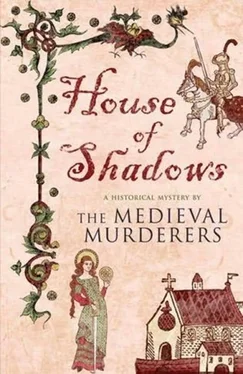‘Why did he drag the body away from the ground where he was killed?’
‘Remorse? Or, as I suggested before: he wanted the body to be concealed, so he pulled Pilgrim’s corpse from high ground where it would have been too obvious, instead setting it down in that malodorous little hollow, so that when he spoke to the woman he loved she wouldn’t glance over his shoulder and see his son lying slaughtered.’
‘Do you think he killed his son because he heard that his son had married her, and jealousy forced him to act as he did?’ Simon wondered.
‘Possibly,’ Baldwin said. Now that he was following a definite path, he was feeling more confident by the moment. ‘He told his son to leave the marsh and leave his lady love to him, and when he did I wonder if Pilgrim laughed at him and taunted him? So many people have said what a generous-hearted, kindly soul Pilgrim was, but even the kindest lad can be cruel to a parent. If his father did not know…A father who doted on his son’s wife would be cause for great humour, I would imagine. The poor man!’
It was mid-afternoon by the time they reached the city gate again, and there Baldwin stopped thoughtfully.
‘I suppose we should go and tell the good coroner about our discovery,’ Simon said, seeing his eyes flitting westwards.
‘That was in my mind. Yet it was my lord bishop who asked us to investigate this crime. Let us inform him first, and then we may arrest William ourselves. I have no desire to inflate the coroner’s reputation.’
So deciding, the two friends set off. Following the line of the Thames, they were forced to take a detour when they reached the Walbrook Stream, but then soon they were out through the west gate and crossing the Fleet river.
Bishop Walter was waiting for them in his hall, but this time he was shouting orders at servants, eyeing parchments full of lists and dictating to a clerk.
‘Ah, Sir Baldwin, I am glad indeed to see you. And you, Simon, of course. Is it possible that you have had some luck in the mission I gave you? I heard that the inquest had been held, but I have to say that I did not feel that the coroner’s conclusion was sound. The idea of the young woman committing murder and then killing herself seems most curious to me.’
‘I think that I have a more credible answer which fits the facts more firmly than the coroner’s.’
Bishop Walter listened intently, waving a clerk away irritably as he heard about the possible jealousy of the older William. ‘But this is astonishing! As you say, were he suddenly to hear from his son that he was unable to marry the woman he adored, that might well tip him over the edge. After all, once she was married to his son, it would be impossible for him to marry her – even if she was a widow. No father may marry a daughter, and the wife of his son has become his daughter, naturally, in God’s eyes.’
‘It may be worse than that,’ Baldwin considered. ‘William had lost his love before, to Sir Henry. The thought of losing his only link with her, her daughter, may have added to his mental turmoil. The poor man!’
‘So the shock drove him to kill his son, and then his daughter-in-law presumably rejected his advances, too, so he slew her. A terrible story, Sir Baldwin. Terrible. The poor man.’
‘It is a shocking tale,’ Baldwin agreed. ‘And I feel that I should go and confront him with his crime. I have the king’s authority to keep his peace. I am sure that with your approval it would be easy enough to go and have him arrested.’
‘I shall raise a small force from my household,’ the bishop promised. Then he hesitated. ‘But one thing. As a courtesy to my friends, would you object to going and telling Sir Henry? He has a right to know how his daughter died, after all.’
‘I should prefer to go straight to William.’ Baldwin’s tone was blank, but he felt angry to have the bishop ask this. It was clearly a political gesture, designed to satisfy the Despensers that Stapledon had done all in his powers to help them. Justice demanded that Baldwin confront the felon, not play the messenger to a politician’s ally.
‘William lives the other side of the river, while Sir Henry is but a short walk away. Would it really make a great difference? It is, as I suggest, merely a matter of courtesy.’
Baldwin considered, glancing at Simon. The bailiff shrugged, then nodded.
No, it was not against any principle of law, so far as Baldwin could see, but the idea of informing a victim’s family of a deliberation before even arresting the man accused seemed wrong: putting the cart before the horse. But if the bishop insisted, Baldwin did not feel strongly enough about it to argue. ‘Very well, my lord. Do you prepare a small force and I shall return here as soon as I may.’
The hall was still, and Baldwin was reminded of a calm before a thunderstorm. There was the noise of servants out behind the hall, but they seemed to be muffled. Baldwin had never before known an English house to be so quiet, and the idea that any master could persuade a rowdy, boisterous group of servants to be so respectful spoke volumes of the love all had for the daughter of the house – or perhaps the fear that all felt for their master.
‘You have something to tell me?’
Henry had appeared in the doorway, and now he strode across the floor to stand near the two visitors.
Baldwin looked at Simon, then said: ‘Sir Henry, we have had some fortune. As I told you yesterday, we have learned that your daughter had married Pilgrim. Their marriage was legal and binding. However, just as you did not know, I think it is likely that Pilgrim’s father was also kept in the dark.’
‘So I am not the only fool, you mean? Should I be grateful for the fact that his son held his father in a similar disregard as my daughter did me?’
‘This is difficult for me to assess, Sir Henry. I never knew your daughter. However, I am convinced that she would not have intended to hurt you or your family. Yet it is all too easy for a young woman to fall in love with a man who…who may not be viewed as quite suitable.’
‘So what are you telling me, then?’
A maid entered the room with a tray on which was one jug and one mazer. She set it on the cupboard, poured a generous helping and took it to her master.
As Baldwin continued, Simon noticed that the girl stopped at the screens entrance and waited, a hand on the doorpost, peering into the room with a pale face as she eavesdropped.
‘We think that the father of Pilgrim learned that his son was going out there to meet your daughter. I read the facts as these: he remonstrated with his son. His son then taunted him with the fact that they were married. The news threw William into a rage and he killed his son and then, when he saw your daughter, he killed her too. Perhaps he was driven mad by the thought of his son’s disobedience.’
Simon was impressed with Baldwin’s cautious description of the events. There was no need to add to the burden of misery already felt by this poor man. He had lost his daughter already: best not to tell him that it might have been solely because this already acknowledged enemy of his had an infatuation for her.
‘So…he killed her. Sweet Christ!’
Simon nodded – and then felt the stirrings of doubt.
Surely if this woman had been the daughter of William’s first love, and he had slain her in a passion, he would have treated her with the same reverence he showed towards his son? Either the man would have left both bodies slumped messily, or both set out gently and kindly? Both had earned his jealous resentment; both deserved equal respect. And surely a man with love in his bones for either must later commit self-murder in disgust and despair? Yet at the inquest William had been so composed.
Читать дальше












